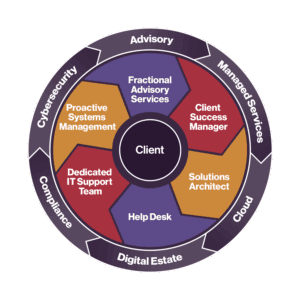Managed IT Services
Support for all aspects of your IT
From traditional to future-ready
All the managed solutions you need
Your IT landscape powers your business. When it runs well, your business runs well. At Integris, we help clients build strong, future-focused technology architecture. Our managed services extend far beyond the “break/fix” models offered by traditional MSPs.
 Fully managed services
Fully managed services
Our Integris fully managed services include all the solutions and consulting you need to keep your systems running and prepare them for success. You’ll get the strategic development that is our stock and trade, with regular gap assessments, infrastructure planning, digital enhancements, and much more. We’ll scale a fully managed package to the size of your organization, so you pay only for those services you need. You get the service and leadership you’d expect from a top-notch IT department, without the overhead of having to hire, train, and retain one.
Flexible managed services
Does your organization already have an IT department? We work with many firms to source the software, security, and other IT solutions you need, through our co-managed services. Consider Integris an extension of your team that can scale up or down based on your needs.
Book a discovery session
The Integris promise

IT best practices
The goal is to provide your business with the IT and technology infrastructure that exceeds best practices for your industry.

Managed IT strategy
From actionable roadmaps to IT budgets, Integris finds system vulnerabilities, manages lifecycles, protects endpoints, and helps build safe systems.

Proactive managed IT
With unified system monitoring, Integris can identify risks or opportunities for expansion—before the need becomes critical.

24/7/365 support
Expert help is always on hand. Our domestic, end-user help desk has a dedicated team that understands your business and offers escalation services with the L2/L3-level engineers at our System and Organization Controls 2 (SOC 2) Operations Center.

Full suite support
We deliver cybersecurity and productivity tools, assist with onboarding/offboarding staff, lifecycle management, monitoring, and remediations to run them efficiently.

Transparent billing
“No surprises” billing, so IT costs are consistent, consolidated, and contained.

IT blueprints
Yearly IT plans that outline upcoming consumption needs and changing regulations.
Responsible IT Architecture (RITA)
We start with a comprehensive assessment using our Responsible IT Architecture framework to identify any current or potential security gaps and ensure you have the tools needed to protect your systems. Next, we deliver a tightly integrated suite of cybersecurity solutions— designed to work together seamlessly to form a hardened, regulation-ready shield. This protects your systems, software, and endpoints, all supported by centralized monitoring and reporting.
Assessments
Integris starts every client relationship with a detailed IT assessment. We check your systems for vulnerabilities and missing documentation, assess your lifecycle management, and review your endpoint security.
Then the assessment analyzes your disaster recovery protocols, security awareness levels of your staff, and where you have opportunities to save in your lifecycle management. Once complete, Integris provides you with an IT plan and budget to improve performance and reduce costs. Integris compares your current IT operations with the standards for your industry vertical, so your operational maturity will always be world-class.
If you’re already working with Integris and need a more detailed, focused review done, we also offer the following assessments:
Cybersecurity assessment
Integris scans for vulnerabilities throughout your network and endpoints, assesses risk, reviews security policies, and updates your disaster recovery protocols. From data management to third-party vendor risk, Integris experts create an action plan that secures your ecosystem.
Cloud assessment
In this assessment, we examine your cloud provider configuration, data protection mechanisms, and more. Once the assessment is complete, Integris provides a cloud architecture plan that optimizes costs, secures your cloud environment, and improves performance.
Network security assessment
If you’re undergoing an expansion or system upgrade, a network security assessment can help you build a cost-effective, secure platform for growth. Build your future on our infrastructure roadmap and network security report.
Microsoft 365 assessment
Implement Microsoft 365 with confidence. Integris assesses your systems for M365 maturity, then provides a security scorecard, remediation roadmap, data protection strategy, and license utilization report.
Advisory services
Fractional C-level IT leadership
Sometimes, special projects arise that don’t fit your projects that need additional expertise. Or perhaps you have emerging needs surrounding cybersecurity governance as your company grows. Either way, Integris has you covered. Integris Advisory Services are perfect when you need IT leadership on a fractional basis.
Fractional CIO
A fractional chief information officer can help you build your IT roadmap for growth and operational efficiency, evaluate your licensing, plan your IT budgets, and ultimately future-proof your business for growth, cyber-resilience, and more.
Fractional CISO
A fractional chief information security officer can be an invaluable resource with extensive cybersecurity as you build a forward-looking cyber-resilience strategy to mitigate risk, reduce exposure, ensure performance, and future-proof your business from threats.
Available on retainer or for hourly projects, they provide an extra level of cybersecurity governance, including the following:
- Writing custom cybersecurity plans, policies, and procedures
- Finding the patterns in your monthly system monitoring, so they can detect when new threats are present, and when new tools and techniques need to be employed
- Preparing for and running your company’s regulatory review response/remediation process
- Providing security documentation and reporting for key audiences, such as cyber-risk insurers, vendors, clients, and your C-suite.
IT managed services reviews
Why our clients consider us part of their team
You never have to worry – when you need them, Integris will be there. That peace of mind is the biggest benefit of our partnership.
Reese Montgomery
Assistant VP / CIO
City National Bank
Every member of their team treats us with respect and professionalism, and it’s always a pleasure to interact with them.
Toni Diaz
Paralegal
Goldstein & Handwerker, LLP
While we were hesitant to turn over a function of the bank as critical as IT, I can say that it has proven to be a good decision.
Reave Scott
Vice Chairman & President
Coleman County State Bank
